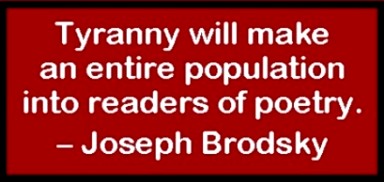Good Morning!

____________________________
Welcome to The Coffee Shop, just for you early risers
on Monday mornings. This is an Open Thread forum,
so if you have an off-topic opinion burning a hole in
your brainpan, feel free to add a comment.
____________________________
And I walked naked
from the beginning
breathing in
my life,
breathing out
poems,
arrogant in innocence …
– from “A Cloak” by Denise Levertov
____________________________
You will see wonderful films about scientists making great discoveries, spectacular biographical films about painters, and films with swelling music about composers. Nobel Prize-winning poet Wislawa Szymborska explains why “poets are the worst” to try to capture on film: “Their work is hopelessly unphotogenic. Someone sits at a table or lies on a sofa while staring motionless at a wall or ceiling. Once in a while this person writes down seven lines, only to cross out one of them fifteen minutes later, and then another hour passes, during which nothing happens . . . . Who could stand to watch this kind of thing?” – from her introduction to Poems New and Collected
Inspiration can come from anything. On an ordinary day, dozens of people may walk right by a flower growing in a pot on the window sill of an apartment, and most of them won’t even notice it. But if one of those people is a poet, that person might stop and really look at the intricacies of the shading of the petals, imagine the perfume wafting around it, and be reminded of something that would be entirely unrelated to that flower in that pot sitting by that window for any other person, and that unlikely connection could become a poem. Or, it could wind up as several pieces of paper covered in crossed-out lines, crumpled in a waste basket.
You might not know much about poetry, but you undoubtedly know what you like. I hope one (or more!) of the poems here will turn out to be something you like.
____________________________
Some People Like Poetry
by Wislawa Szymborska
Some people—
that means not everyone.
Not even most of them, only a few.
Not counting school, where you have to,
and poets themselves,
you might end up with something like two per thousand.
Like—
but then, you can like chicken noodle soup,
or compliments, or the color blue,
your old scarf,
your own way,
petting the dog.
Poetry—
but what is poetry anyway?
More than one rickety answer
has tumbled since that question first was raised.
But I just keep on not knowing, and I cling to that
like a redemptive handrail.
– translated by Stanislaw Baranczak and Clare Cavanagh
“Some People like Poetry” from Poems New and Collected 1957-1997, © 1999 by Wislawa Szymborska – Gardners Books
Wislawa Szymborska (1923-2012) Polish poet, essayist, translator, and recipient of the 1996 Nobel Prize in Literature. The Nobel award committee’s citation called her the “Mozart of poetry,” a woman who mixed the elegance of language with “the fury of Beethoven.” Ironically, she was not a prolific poet – she published less than 350 poems. When asked why she had published so few poems, she said: “I have a trash can in my home.” Although initially close to the official party line of the Polish Communist Party, as it shifted to nationalist communism, Szymborska grew estranged from socialist ideology and renounced her earlier political work. She did not officially leave the Communist party until 1966, but as early as 1957, she began to establish contacts with dissidents, including Jerzy Giedroyc, the editor of the influential Paris-based émigré journal Kultura, to which she contributed. Her one-of-a kind advice book, How to Start Writing (and When to Stop) is now a classic.
____________________________
Digging
by Seamus Heaney
Between my finger and my thumb
The squat pen rests; snug as a gun.
Under my window, a clean rasping sound
When the spade sinks into gravelly ground:
My father, digging. I look down
Till his straining rump among the flowerbeds
Bends low, comes up twenty years away
Stooping in rhythm through potato drills
Where he was digging.
The coarse boot nestled on the lug, the shaft
Against the inside knee was levered firmly.
He rooted out tall tops, buried the bright edge deep
To scatter new potatoes that we picked,
Loving their cool hardness in our hands.
By God, the old man could handle a spade.
Just like his old man.
My grandfather cut more turf in a day
Than any other man on Toner’s bog.
Once I carried him milk in a bottle
Corked sloppily with paper. He straightened up
To drink it, then fell to right away
Nicking and slicing neatly, heaving sods
Over his shoulder, going down and down
For the good turf. Digging.
The cold smell of potato mould, the squelch and slap
Of soggy peat, the curt cuts of an edge
Through living roots awaken in my head.
But I’ve no spade to follow men like them.
Between my finger and my thumb
The squat pen rests.
I’ll dig with it.
“Digging” from Death of a Naturalist, ©1966 by Seamus Heaney – Farrar, Straus & Giroux
Seamus Heaney (1939-2013), one of the major poets of the 20th century, was born in Northern Ireland, and later lived in Dublin for many years. He was the author of over 20 volumes of poetry and criticism, and won the 1955 Nobel Prize for Literature. Heaney taught at Harvard University (1985-2006) and served as the Oxford Professor of Poetry (1989-1994).
___________________________
Days I Enjoy
by Vita Sackville West
Days I enjoy are days when nothing happens,
When I have no engagements written on my block,
When no one comes to disturb my inward peace,
When no one comes to take me away from myself
And turn me into a patchwork, a jig-saw puzzle,
A broken mirror that once gave a whole reflection,
Being so contrived that it takes too long a time
To get myself back to myself when they have gone.
The years are too strickly measured, and life too short
For me to afford such bits of myself to my friends.
And what have I to give my friends in the last resort?
An awkwardness, a shyness, and a scrap,
No thing that’s truly me, a bootless waste,
A waste of myself and them, for my life is mine
And theirs presumably theirs, and cannot touch.
“Days I Enjoy” from Collected Poems, © 1933 by Vita Sackville West – Hogarth Press
Vita Sackville-West (1892-1962) English aristocrat, novelist, poet, journalist, prolific letter writer, diarist, and garden designer. She published more than a dozen collections of poetry, 13 novels, and wrote a regular column (1946-1961) for The Observer newspaper. She married Harold Nicolson in 1913, and their complicated relationships gave a whole new meaning to “open marriage.” Her designs for the garden at the home she and her husband bought in 1930, Sissinghurst Castle, are much admired. Sackville-West often dressed as a man, and had relationships with both men and women, including authors Violet Keppel and Virginia Woolf. Sackville-West described her husband in Portrait of a Marriage: “Harold had a series of relationships with men who were his intellectual equals, but the physical element in them was very secondary. He was never a passionate lover. To him sex was as incidental, and about as pleasurable as a quick visit to a picture-gallery between trains.” Sackville-West died at age 70 from cancer. Sissinghurst Castle has been a National Trust property since 1967.
____________________________
Using lines from other poets, Carol Ann Duffy made a new poem:
The Love Poem
by Carol Ann Duffy
Till love exhausts itself, longs
for the sleep of words –
my mistress’ eyes –
to lie on a white sheet, at rest
in the language –
let me count the ways –
or shrink to a phrase like an epitaph –
come live
with me –
or fall from its own high cloud as syllables
in a pool of verse –
one hour with thee.
Till love gives in and speaks
in the whisper of art –
dear heart,
how like you this? –
love’s lips pursed to quotation marks
kissing a line –
look in thy heart
and write –
love’s light fading, darkening,
black as ink on a page –
there is a garden
in her face.
Till love is all in the mind –
O my America!
my new-found land –
or all in the pen
in the writer’s hand –
behold, thou art fair –
not there, except in a poem,
known by heart like a prayer,
both near and far,
near and far –
the desire of the moth
for the star.
“The Love Poem” from Collected Poems, © 2015 by Carol Ann Duffy – Picador, Pan Macmillan
Carol Ann Duffy (1955 –) — Scottish poet and playwright, became the first woman, first Scot, and first openly LGBT person appointed as Britain’s Poet Laureate (2009-2019). Her 1985 poetry collection, Standing Female Nude, won the first of her three Scottish Arts Council Book Awards. Mean Time (1993) won the Whitbread Poetry Prize. She also won the 1995 Lannan Literary Award for Poetry, and many other honors. In Duffy’s The World’s Wife, she gives us a collection of modern versions of the old tales, with an unsettling feminist twist.
____________________________
Light is More Important than the Lantern
by Nizar Qabbani
Light is more important than the lantern,
The poem more important than the notebook,
And the kiss more important than the lips.
My letters to you
Are greater and more important than both of us.
They are the only documents
Where people will discover
Your beauty
And my madness.
– translated by Bassam K. Frangieh and Clementina Brown
“Light is More Important than the Lantern” from Arabian Love Poems (1999 revised edition) – Three Continents Press
Nizar Qabbani (1923-1998) was born on March 21; Syrian poet, diplomat and women’s rights activist, serving in Syrian missions in Beirut, Cairo, Istanbul, Madrid, and London, and as UAR Vice-Secretary at their Chinese embassy. His sister’s suicide under pressure when she refused to marry a man she did not love made a profound impression on Qabbani, who was 15 years old at the time. He began writing poetry the following year. “Love in the Arab world is like a prisoner, and I want to set [it] free … The relationships between men and women in our society are not healthy.” He died at age 75 of a heart attack. Qabbani is often named as Syria’s National Poet.
____________________________
Variation on a Theme by Rilke
by Denise Levertov
A certain day became a presence to me;
there it was, confronting me—a sky, air, light:
a being. And before it started to descend
from the height of noon, it leaned over
and struck my shoulder as if with
the flat of a sword, granting me
honor and a task. The day’s blow
rang out, metallic—or it was I, a bell awakened,
and what I heard was my whole self
saying and singing what it knew: I can.
“Variation on a Theme by Rilke” from The Collected Poems of Denise Levertov, © 2013 by The Denise Levertov Literary Trust – New Directions Press
Denise Levertov (1923-1997) British-born American poet, known for her anti-Vietnam war poems in the 1960s and 1970s, which also included themes of destruction by greed, racism, and sexism. Her later poetry reflects her conversion to Catholicism. No matter the subject, she was always an acute observer, and wrote with a rare combination of economy and grace. Levertov was the author of 24 books of poetry, as well as non-fiction, and she served as poetry editor of The Nation and Mother Jones. She was honored with the Robert Frost Medal in 1990, and the Lannan Literary Award for Poetry in 1993. In 1997, Levertov died from complications of lymphoma at the age of seventy-four.
____________________________

____________________________
